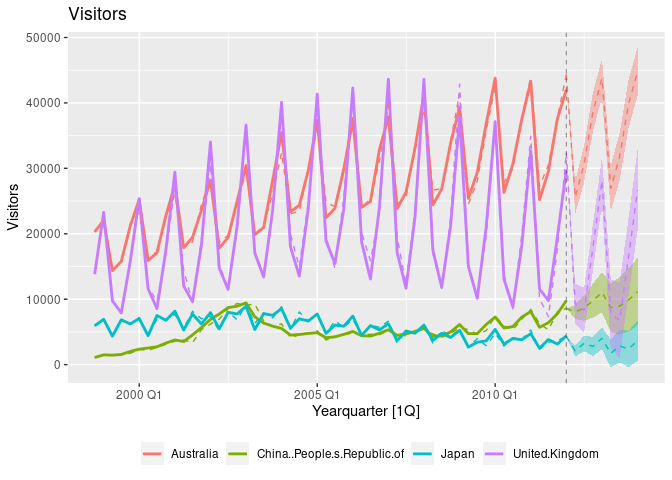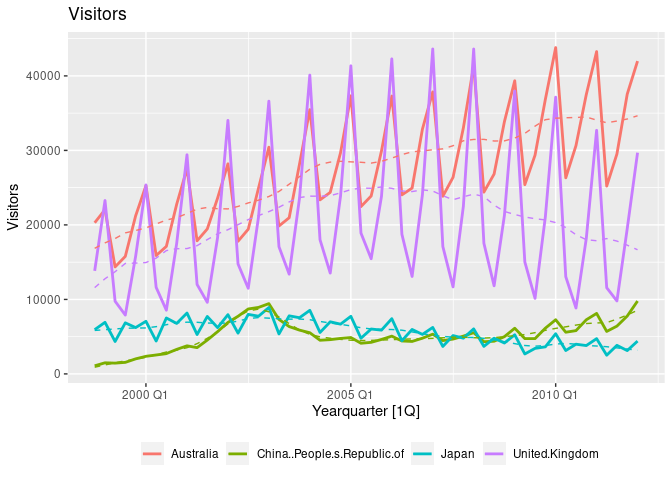Overview
The iNZightTS package provides some simple analysis tools for exploring time series data, which is used by iNZight. The package uses tidyverts to store and process time series data and ggplot2 to produce customisable graphics.
Installation
The stable version can be installed from CRAN:
install.packages("iNZightTS")Install from GitHub:
remotes::install_github("iNZightVIT/iNZightTS")Usage
Getting started
Use the inzightts function to create a temporal data set to be used by the functions of the package. The data is stored as a tsibble.
data <- visitorsQ |>
tidyr::pivot_longer(!Date, names_to = "Country", values_to = "Visitors") |>
inzightts(key = "Country")
data
#> # A tsibble: 216 x 3 [1Q]
#> # Key: Country [4]
#> index Country Visitors
#> <qtr> <chr> <int>
#> 1 1998 Q4 Australia 20288
#> 2 1999 Q1 Australia 22047
#> 3 1999 Q2 Australia 14362
#> 4 1999 Q3 Australia 15775
#> 5 1999 Q4 Australia 21209
#> 6 2000 Q1 Australia 25261
#> 7 2000 Q2 Australia 15891
#> 8 2000 Q3 Australia 17117
#> 9 2000 Q4 Australia 22761
#> 10 2001 Q1 Australia 27539
#> # ℹ 206 more rowsDecompositions
Time series data often exhibit features such as trend, season and cycle. A decomposition plot breaks the data into visual components which simplies the analysis.
dcmp <- data |>
dplyr::filter(Country == "Australia") |>
inzightts() |>
decomp()
dcmp
#> # A dable: 54 x 8 [1Q]
#> # Key: Country, .model [1]
#> # : Visitors = trend + season_year + remainder
#> Country .model index Visitors trend season_year remainder season_adjust
#> * <chr> <chr> <qtr> <dbl> <dbl> <dbl> <dbl> <dbl>
#> 1 Australia feasts::STL(Visitors ~ tre… 1998 Q4 20288 16858. 2191. 1239. 18097.
#> 2 Australia feasts::STL(Visitors ~ tre… 1999 Q1 22047 17586. 7515. -3054. 14532.
#> 3 Australia feasts::STL(Visitors ~ tre… 1999 Q2 14362 18173. -5731. 1920. 20093.
#> 4 Australia feasts::STL(Visitors ~ tre… 1999 Q3 15775 18928. -3975. 822. 19750.
#> 5 Australia feasts::STL(Visitors ~ tre… 1999 Q4 21209 19248. 2191. -230. 19018.
#> 6 Australia feasts::STL(Visitors ~ tre… 2000 Q1 25261 19601. 7515. -1855. 17746.
#> 7 Australia feasts::STL(Visitors ~ tre… 2000 Q2 15891 20127. -5731. 1496. 21622.
#> 8 Australia feasts::STL(Visitors ~ tre… 2000 Q3 17117 20652. -3975. 439. 21092.
#> 9 Australia feasts::STL(Visitors ~ tre… 2000 Q4 22761 20972. 2191. -402. 20570.
#> 10 Australia feasts::STL(Visitors ~ tre… 2001 Q1 27539 21528. 7515. -1504. 20024.
#> # ℹ 44 more rows
plot(dcmp, title = "Visitors to Australia")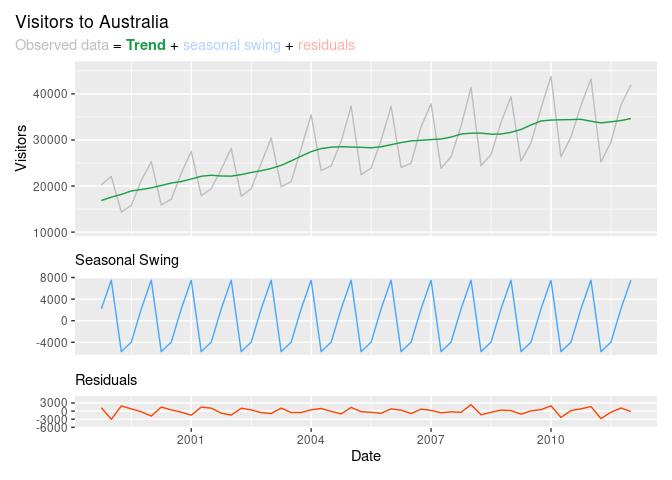
Visualising seasonal effects
Plots are helpful in revealing the underlying seasonal pattern of time series data.
seasonplot(data)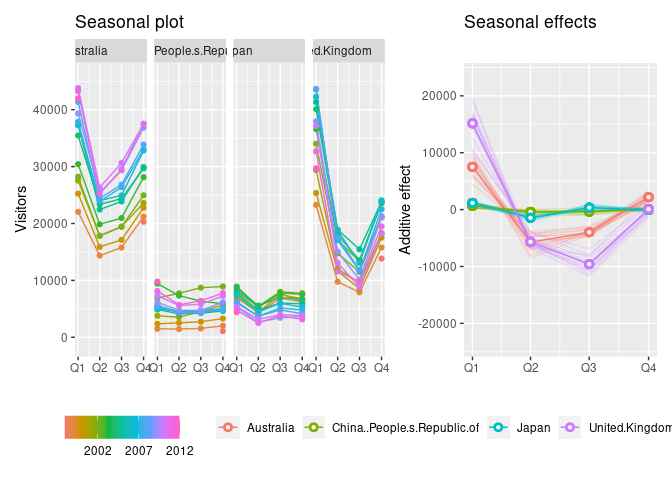
subseries(data)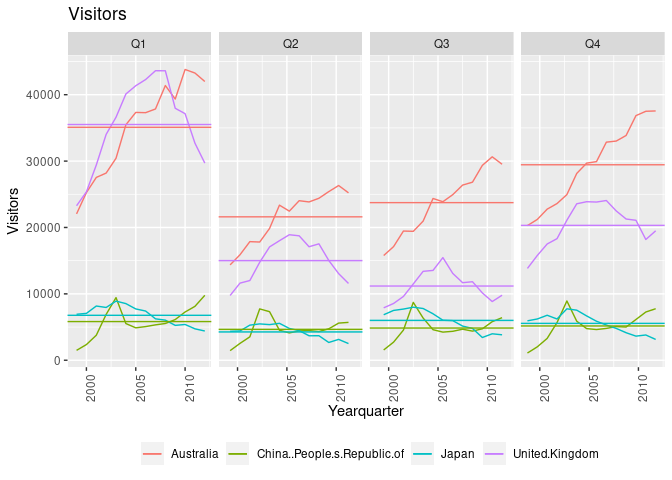
Forecasting
pred <- predict(data)
summary(pred)
#>
#> 95% Prediction Interval
#> # A tsibble: 32 x 5 [1Q]
#> # Key: Country [4]
#> Country Time Fitted Lower Upper
#> <chr> <qtr> <dbl> <dbl> <dbl>
#> 1 Australia 2012 Q2 25550. 23052. 28047.
#> 2 Australia 2012 Q3 30625. 27790. 33461.
#> 3 Australia 2012 Q4 38674. 35748. 41600.
#> 4 Australia 2013 Q1 43773. 40821. 46724.
#> 5 Australia 2013 Q2 26915. 23421. 30409.
#> 6 Australia 2013 Q3 31797. 28162. 35433.
#> 7 Australia 2013 Q4 39874. 36199. 43549.
#> 8 Australia 2014 Q1 44769. 41082. 48456.
#> 9 China..People.s.Republic.of 2012 Q2 8069. 6999. 9138.
#> 10 China..People.s.Republic.of 2012 Q3 8624. 6704. 10544.
#> 11 China..People.s.Republic.of 2012 Q4 9797. 7199. 12395.
#> 12 China..People.s.Republic.of 2013 Q1 11054. 7964. 14145.
#> 13 China..People.s.Republic.of 2013 Q2 8710. 4944. 12477.
#> 14 China..People.s.Republic.of 2013 Q3 8957. 4581. 13333.
#> 15 China..People.s.Republic.of 2013 Q4 9874. 5038. 14710.
#> 16 China..People.s.Republic.of 2014 Q1 11139. 5991. 16287.
#> 17 Japan 2012 Q2 2106. 1267. 2945.
#> 18 Japan 2012 Q3 3239. 2052. 4425.
#> 19 Japan 2012 Q4 2789. 1336. 4242.
#> 20 Japan 2013 Q1 4017. 2340. 5695.
#> 21 Japan 2013 Q2 1719. -397. 3835.
#> 22 Japan 2013 Q3 2851. 374. 5329.
#> 23 Japan 2013 Q4 2401. -391. 5194.
#> 24 Japan 2014 Q1 3630. 554. 6706.
#> 25 United.Kingdom 2012 Q2 9296. 6244. 12349.
#> 26 United.Kingdom 2012 Q3 8283. 4829. 11737.
#> 27 United.Kingdom 2012 Q4 17986. 14450. 21522.
#> 28 United.Kingdom 2013 Q1 28182. 24566. 31798.
#> 29 United.Kingdom 2013 Q2 7784. 2531. 13037.
#> 30 United.Kingdom 2013 Q3 6771. 1006. 12535.
#> 31 United.Kingdom 2013 Q4 16474. 10514. 22434.
#> 32 United.Kingdom 2014 Q1 26670. 20520. 32820.
#>
#> Model:
#> # A mable: 4 x 2
#> # Key: Country [4]
#> Country Visitors
#> <chr> <model>
#> 1 Australia <ARIMA(1,0,0)(1,1,0)[4] w/ drift>
#> 2 China..People.s.Republic.of <ARIMA(2,0,0)(1,1,0)[4]>
#> 3 Japan <ARIMA(0,1,0)(0,1,1)[4]>
#> 4 United.Kingdom <ARIMA(0,1,2)(0,1,0)[4]>
plot(pred)